Ezra 7 meaning explained in AI Summary
This chapter details Ezra's journey from Babylon to Jerusalem, highlighting his lineage, mission, and the Persian king's support.
1. Ezra's Lineage and Credentials (vv. 1-5): The chapter begins by establishing Ezra's impressive priestly lineage, tracing it back to Aaron. He is described as a "scribe skilled in the Law of Moses," emphasizing his religious authority and knowledge.
2. The Journey Begins (vv. 6-10): Ezra leads a group of exiles back to Jerusalem in the seventh year of King Artaxerxes. The text emphasizes Ezra's dedication to studying, obeying, and teaching the Law of God.
3. Artaxerxes' Decree and Support (vv. 11-26): A significant portion of the chapter focuses on the letter from King Artaxerxes. The king grants Ezra permission to return to Jerusalem and provides substantial resources for the journey and the temple. This includes:
* Financial Support: Silver, gold, and supplies for offerings.
* Religious Freedom: Freedom to practice and teach the Law of God.
* Authority: Power to appoint judges and officials to enforce the Law.
4. Ezra's Gratitude and Purpose (vv. 27-28): Ezra acknowledges God's hand in moving the king's heart and expresses his gratitude. He recognizes the importance of his mission to teach the Law in Jerusalem.
Key Themes:
- Restoration: This chapter marks a significant step in the restoration of Israel after the exile.
- The Importance of the Law: Ezra's mission centers around studying, obeying, and teaching the Law of Moses, highlighting its central role in Jewish life.
- God's Sovereignty: The chapter emphasizes God's work in moving the heart of a foreign king to support the Israelites' return and the restoration of their religious practices.
Overall, Ezra chapter 7 sets the stage for Ezra's work in Jerusalem, emphasizing his qualifications, mission, and the divine favor that accompanies him.
Ezra 7 bible study ai commentary
Ezra 7 chronicles the second return of exiles to Judah, marking a pivotal shift from rebuilding the Temple to restoring the people through the Law of God. The chapter introduces Ezra, a priest and scribe, commissioned by God's providence through a decree from the Persian king Artaxerxes. It details Ezra’s lineage, his personal dedication to God's Law, the king's remarkably generous decree supporting his mission, and Ezra's heartfelt praise to God for His sovereign grace.
Ezra 7 context
This chapter takes place in 458 BC, about 58 years after the Temple was completed (as described in Ezra 6). This significant time gap often points to a period of spiritual stagnation and compromise among the returned exiles in Judah, making Ezra's mission of spiritual reform urgent. The Persian king, Artaxerxes I Longimanus, likely saw value in this mission to stabilize the volatile Judean region, which was on the empire's border with a rebellious Egypt. The official decree in this chapter is written in Aramaic (vv. 12-26), the administrative language of the Persian Empire, while the narrative surrounding it is in Hebrew.
Ezra 7:1-5
After these things, in the reign of Artaxerxes king of Persia, Ezra the son of Seraiah, son of Azariah, son of Hilkiah, son of Shallum, son of Zadok, son of Ahitub, son of Amariah, son of Azariah, son of Meraioth, son of Zerahiah, son of Uzzi, son of Bukki, son of Abishua, son of Phinehas, son of Eleazar, son of Aaron the chief priest—
In-depth-analysis
- Genealogy as Authority: This abbreviated genealogy establishes Ezra's impeccable priestly credentials. It links him directly to Aaron, the first High Priest, legitimizing his authority to handle sacred matters.
- Seraiah: Mentioning Seraiah, the last high priest before the Babylonian exile (2 Kings 25:18-21), is significant. It intentionally bridges the gap of the exile, presenting Ezra's work as a direct continuation of the pre-exilic priesthood.
- Selective Lineage: This is not an exhaustive list but a curated one, highlighting the most prominent names in the high priestly line to emphasize purity and legitimacy. It strategically omits about six generations to make its theological point more forcefully.
Bible references
- 1 Chronicles 6:4-15: "And Eleazar begat Phinehas... and Jehozadak went into captivity..." (Provides the more complete priestly lineage from which Ezra's is drawn).
- 2 Kings 25:18: "And the captain of the guard took Seraiah the chief priest..." (Confirms Seraiah as the High Priest at the time of Jerusalem's fall).
Cross references
Jer 52:24 (Seraiah's execution); Num 25:11-13 (Phinehas's zeal); 1 Chron 24:1-3 (Priestly divisions).
Ezra 7:6
this Ezra went up from Babylon. He was a scribe skilled in the Law of Moses that the LORD, the God of Israel, had given. And the king granted him all that he asked, for the hand of the LORD his God was on him.
In-depth-analysis
- Word: Scribe (sopher). More than a mere copyist, a sopher was a scholar, an expert interpreter, and a teacher of the Law. Ezra represents the rise of rabbinic-style scholarship focused on preserving and applying the Torah.
- Word: Skilled (mahir). Implies expertise, speed, and diligence. Ezra was exceptionally proficient in understanding and expounding on God's Word.
- Divine Empowerment: The key phrase "for the hand of the LORD his God was on him" is introduced. This is the ultimate reason for Ezra's success—divine favor and active help—not his skill or the king's permission.
- Dual Authority: Ezra's mission is sanctioned by both divine and human authority: the Law "the LORD...had given" and the decree of the "king."
Bible references
- Nehemiah 2:8: "...And the king granted me what I asked, for the good hand of my God was upon me." (Identical theme of divine favor influencing a Persian king).
- Proverbs 21:1: "The king's heart is a stream of water in the hand of the LORD; he turns it wherever he will." (Theological principle explaining why Artaxerxes was favorable).
Cross references
Matt 23:2 (scribes and Pharisees); Deut 33:10 (priestly teaching role); Psa 45:1 (a ready scribe); Acts 11:21 (the hand of the Lord with the early church).
Ezra 7:7-9
And there went up also to Jerusalem, in the seventh year of Artaxerxes the king, some of the people of Israel, and some of the priests and Levites, the singers and gatekeepers, and the temple servants... And he came to Jerusalem in the fifth month, which was in the seventh year of the king. For on the first day of the first month he began the journey from Babylon, and on the first day of the fifth month he came to Jerusalem, according to the good hand of his God on him.
In-depth-analysis
- Precise Dating: The chronicling of the exact dates (started 1st of Nisan, arrived 1st of Ab) emphasizes the historicity of the event and the journey's length—four months over approximately 900 miles.
- Repetition of Theme: The phrase "according to the good hand of his God on him" is repeated, reinforcing that the safe and successful completion of this arduous journey was an act of God's direct providence and protection.
- Diverse Group: Ezra did not travel alone. He led a new wave of returning exiles, specifically including the various classes of Temple personnel needed to re-establish proper worship.
Bible references
- Ezra 8:31: "Then we departed from the river Ahava... and the hand of our God was upon us, and he delivered us from the hand of the enemy..." (Shows this divine protection in action during the journey).
- Genesis 12:1-4: "...So Abram went, as the LORD had told him..." (Parallels a divinely-called journey to the promised land).
Cross references
Neh 2:11 (Nehemiah's arrival in Jerusalem); Ezra 2:43-58 (Categories of temple servants).
Ezra 7:10
For Ezra had set his heart to study the Law of the LORD, and to do it and to teach his statutes and rules in Israel.
In-depth-analysis
- The Heart of Ezra's Mission: This verse is the theological center of the chapter and a summary of Ezra's entire life purpose.
- Word: Set (kûn). This Hebrew word means to prepare, establish, or firmly fix. Ezra deliberately and steadfastly oriented his life's passion toward the Word of God.
- Threefold Model: Ezra's approach provides a timeless model for any spiritual leader or believer:
- To Study (lidrosh): To diligently seek, inquire, and master the content of God's Word.
- To Do (la'asot): To personally apply and obey the Word. His teaching had integrity because it was preceded by his own practice.
- To Teach (ul'lamed): To instruct others in the principles and applications of the Law.
Bible references
- James 1:22: "But be doers of the word, and not hearers only, deceiving yourselves." (Echoes Ezra's second step: doing before teaching).
- Matthew 28:19-20: "...teaching them to observe all that I have commanded you." (The Great Commission mirrors Ezra's goal of teaching God's commands).
- Deuteronomy 6:6-7: "And these words that I command you today shall be on your heart. You shall teach them diligently to your children..." (The original mandate for Israel which Ezra was fulfilling).
Cross references
Psa 119:97-100 (Love for and meditation on the Law); 2 Tim 2:15 (Rightly handling the word); Deut 31:12 (Gather the people to hear and learn).
Ezra 7:11-26 (The Letter of Artaxerxes)
Ezra 7:11-13: The Commission
This is a copy of the letter that King Artaxerxes gave to Ezra the priest, the scribe, a man learned in matters of the commandments of the LORD... “Artaxerxes, king of kings, to Ezra the priest, the scribe of the law of the God of heaven... I make a decree that anyone of the people of Israel or their priests or Levites in my kingdom, who freely offers to go to Jerusalem, may go with you.”
- Official Language: The text switches to Aramaic, the imperial language, attesting to the letter's authenticity as a state document.
- King of Kings: A standard, grandiose title for Persian monarchs, not a claim to divinity but to rule over lesser kings and governors.
- Voluntary Return: The return is authorized but voluntary ("who freely offers"), aligning with the principle of willing-hearted service seen throughout the restoration.
Ezra 7:14-20: The Provision
For you are sent by the king and his seven counselors to make inquiries about Judah and Jerusalem according to the Law of your God, which is in your hand... all the gold and silver that you shall find in all the province of Babylonia... with the freewill offering of the people... whatever else is required... you may provide from the king's treasury.
- State-Sponsored Mission: The mission is not just permitted but commissioned by the king and his highest advisory council. This is high-level state policy.
- Financial Backing: Ezra is entrusted with three sources of funding: the king's personal offering, offerings from the general Persian populace, and offerings from the Jews still in Babylon.
- Blank Check: Verse 20 gives Ezra astonishing authority to draw whatever is needed for the Temple from the royal treasury.
Ezra 7:21-24: The Commands to Treasurers
And I, Artaxerxes the king, make a decree to all the treasurers... that whatever Ezra... requires of you, be it done with all diligence, up to 100 talents of silver, 100 cors of wheat, 100 baths of wine, 100 baths of oil, and salt without prescribing how much... I also decree that it shall not be lawful to impose tribute, custom, or toll on any of the priests, Levites... or other servants of this house of God.
- Massive Quantities: The specified limits (a talent of silver was ~75 pounds) were enormous, ensuring the mission was overwhelmingly well-resourced. The provision of salt, a key element in sacrifices (Lev 2:13), shows a detailed, perhaps even divinely-influenced, understanding of Israelite worship.
- Tax Exemption: This was a significant economic and political privilege, designed to encourage Temple service and show royal favor to the religious establishment of Judah.
Ezra 7:25-26: The Authority
And you, Ezra, according to the wisdom of your God that is in your hand, appoint magistrates and judges who may judge all the people in the province Beyond the River, all such as know the laws of your God. And those who do not know them, you shall teach... Whoever will not obey the law of your God and the law of the king, let judgment be strictly executed on him, whether for death or for banishment or for confiscation of his goods or for imprisonment.
- Merging of Laws: This is the most stunning part of the decree. The Persian king authorizes Ezra to enforce the "law of your God" as the "law of the king" for the Jewish community.
- Judicial Power: Ezra is given authority to set up a complete judicial system, appointing judges and magistrates.
- Evangelistic Mandate: He is even commanded to "teach" the law to those who do not know it, a state-sponsored religious education program.
- Enforcement Power: The state sanctions the enforcement of God's Law with severe civil penalties, including capital punishment.
Bible references for 7:11-26
- Daniel 6:1-3, 25-27: (Shows a precedent for Persian kings making decrees that honor God and structure the administration).
- Ezra 1:1-4: "The LORD stirred up the spirit of Cyrus king of Persia, so that he made a proclamation..." (Artaxerxes' decree is a second, even more detailed, example of God's sovereign control over gentile rulers for Israel's sake).
- Deuteronomy 17:18-20: "...he shall write for himself in a book a copy of this law... and he shall read in it all the days of his life..." (Artaxerxes, a pagan king, ironically shows more practical reverence for God's law than many of Israel's own kings).
Cross references for 7:11-26
Prov 8:15 (Wisdom and kings); Dan 2:21 (God removes/sets up kings); Isa 45:1-7 (God using Cyrus); Neh 2:1-8 (Artaxerxes' later favor to Nehemiah); Lev 2:13 (Salt of the covenant).
Polemics
The decree's profound respect for the God of Israel serves as a subtle polemic against the Israelites themselves, who had neglected the Law God had given them. A pagan king is shown taking God's Law more seriously and providing more for His worship than the community in Jerusalem. Some scholars suggest Artaxerxes' motives were purely political—a well-ordered, loyal province run by a trusted administrator (Ezra) was a strategic asset against Egypt. However, the text presents it as the direct work of God.
Ezra 7:27-28
Blessed be the LORD, the God of our fathers, who put such a thing as this into the heart of the king, to beautify the house of the LORD that is in Jerusalem, and has extended to me his steadfast love before the king and his counselors, and before all the king's mighty officials. I took courage, for the hand of the LORD my God was on me, and I gathered leading men from Israel to go up with me.
In-depth-analysis
- Switch to Hebrew and First Person: Ezra moves from recording the official document to his personal, heartfelt response. The text shifts from Aramaic back to Hebrew and from third-person to first-person narration ("me," "I").
- Doxology: Ezra's immediate reaction is not self-congratulation but praise (baruch YHWH - "Blessed be the LORD"). He gives God complete credit for influencing the king's heart.
- God's Steadfast Love: He recognizes the king's favor as a manifestation of God's hesed (steadfast love, mercy, covenant loyalty).
- Courage from God's Hand: The chapter concludes by returning to its central theme. Ezra "took courage" or was "strengthened" because he recognized that the "hand of the LORD my God was on me." His confidence for the monumental task ahead was rooted entirely in God's empowerment.
Bible references
- Daniel 2:20-23: "Daniel answered and said: 'Blessed be the name of God forever and ever... he gives wisdom to the wise... I thank you and praise you, O God of my fathers...'" (A similar doxology giving God credit for revealing secrets to a gentile king).
- 1 Corinthians 15:10: "But by the grace of God I am what I am... It was not I, but the grace of God that is with me." (The New Testament expression of Ezra's humility and reliance on God).
Cross references
Gen 24:27 (Praise for God's guidance); Phil 4:13 (Strength in Christ); 1 Chron 29:10-13 (David's prayer of praise).
Ezra 7 analysis
- The 57-Year Gap: The nearly six-decade silence between chapters 6 and 7 implies that rebuilding the physical Temple was not enough. Without a heart for God's Word, the community languished spiritually, becoming religiously syncretic and morally compromised (as revealed in Ezra 9). Ezra's arrival signals God's new phase of restoration: rebuilding the people's identity around the Torah.
- Ezra, the "Second Moses": A strong parallel can be drawn between Moses and Ezra. Both lead an exodus (from Egypt / from Babylon), both are mediators of God's Law to Israel, and both work to establish Israel as a community defined by its covenant with God. Moses brought the Law from Sinai; Ezra brought the Law back to the heart of the restored community in Jerusalem.
- The Theme of "God's Hand": The phrase "the hand of the LORD" appears five times in Ezra-Nehemiah (Ezra 7:6, 9, 28; 8:18; Neh 2:8). It serves as a constant reminder that all political success, physical protection, and personal courage are the direct result of God's sovereign, active intervention in human affairs.
- Sovereignty and Evangelism: Artaxerxes's decree is a stunning example of God's sovereignty. Yet, within that decree is a command for Ezra to "teach" the Law to those who do not know it (v. 25). This shows how God's sovereign plan incorporates human responsibility to proclaim His truth.
Ezra 7 summary
Ezra 7 details God's initiation of the second phase of post-exilic restoration. It introduces Ezra, a priest and expert scribe, who dedicates himself to studying, living, and teaching God's Law. Through His sovereign influence over King Artaxerxes, God provides an official decree, extraordinary resources, and legal authority for Ezra to lead a new group of exiles back to Jerusalem and re-establish the Law of God as the foundation of the community's life.
Ezra 7 AI Image Audio and Video

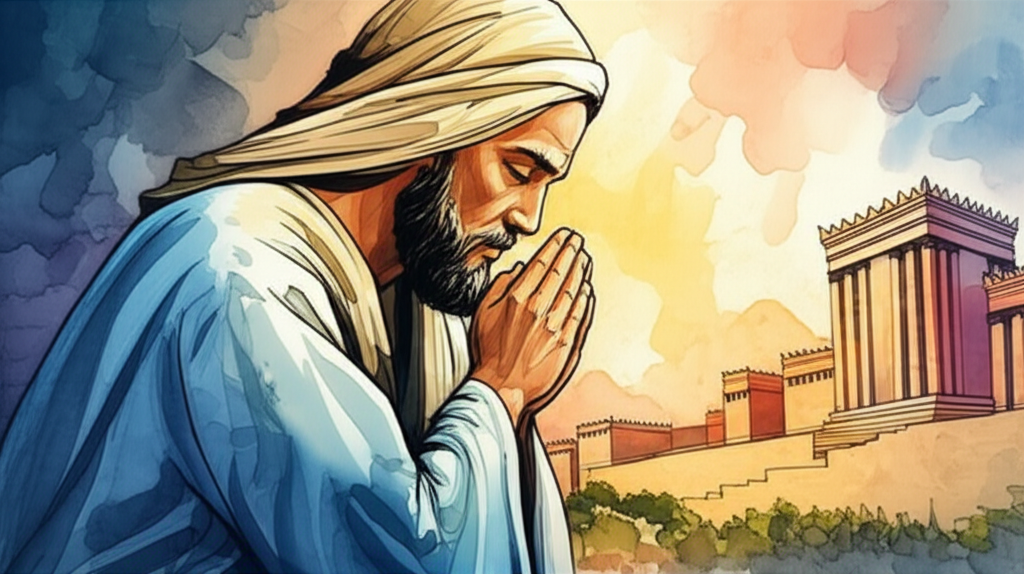
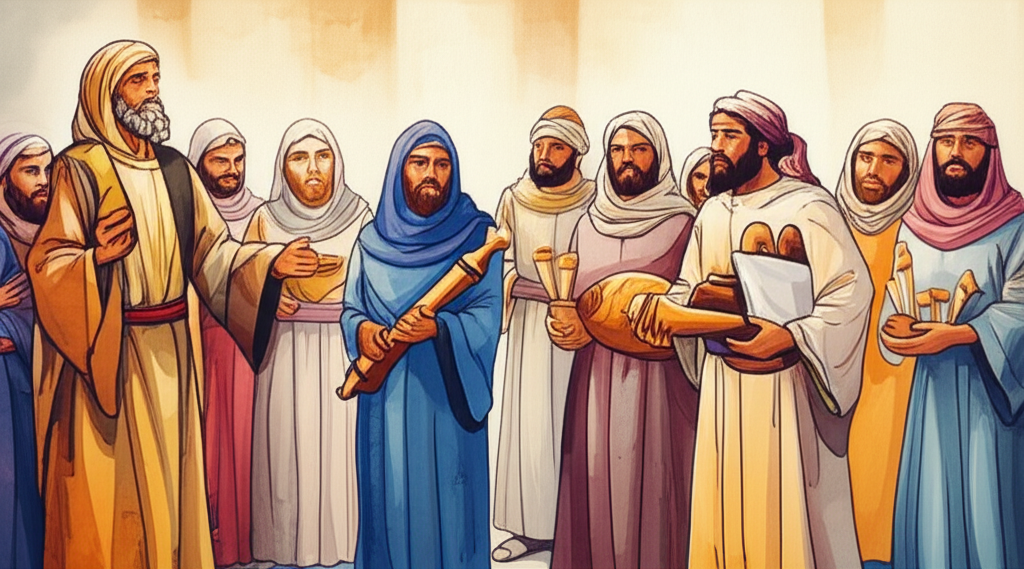
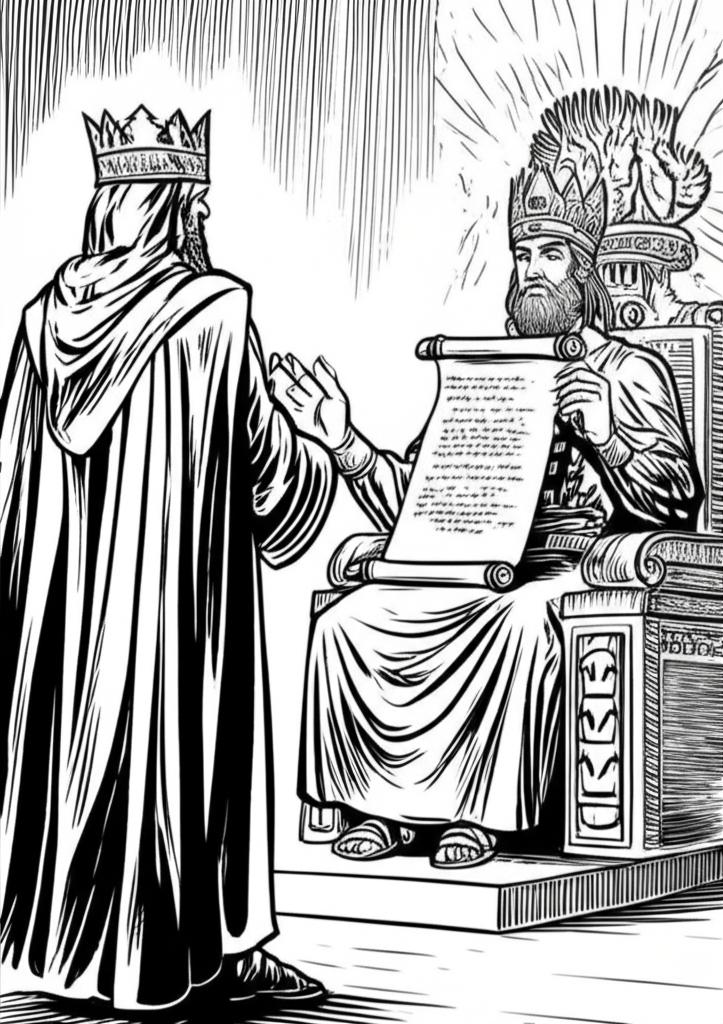
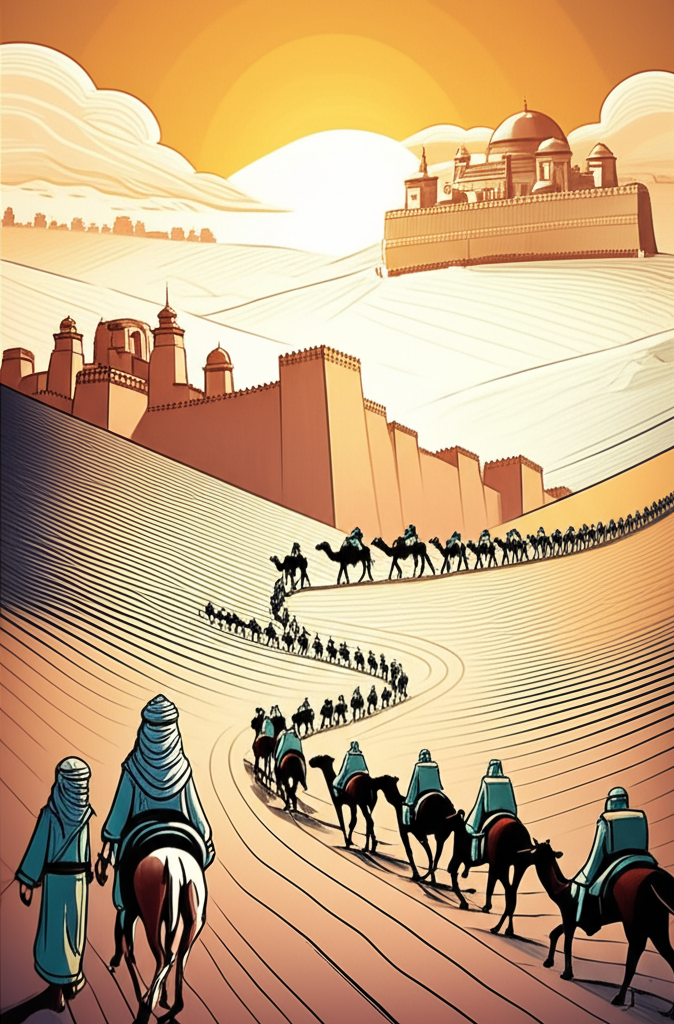
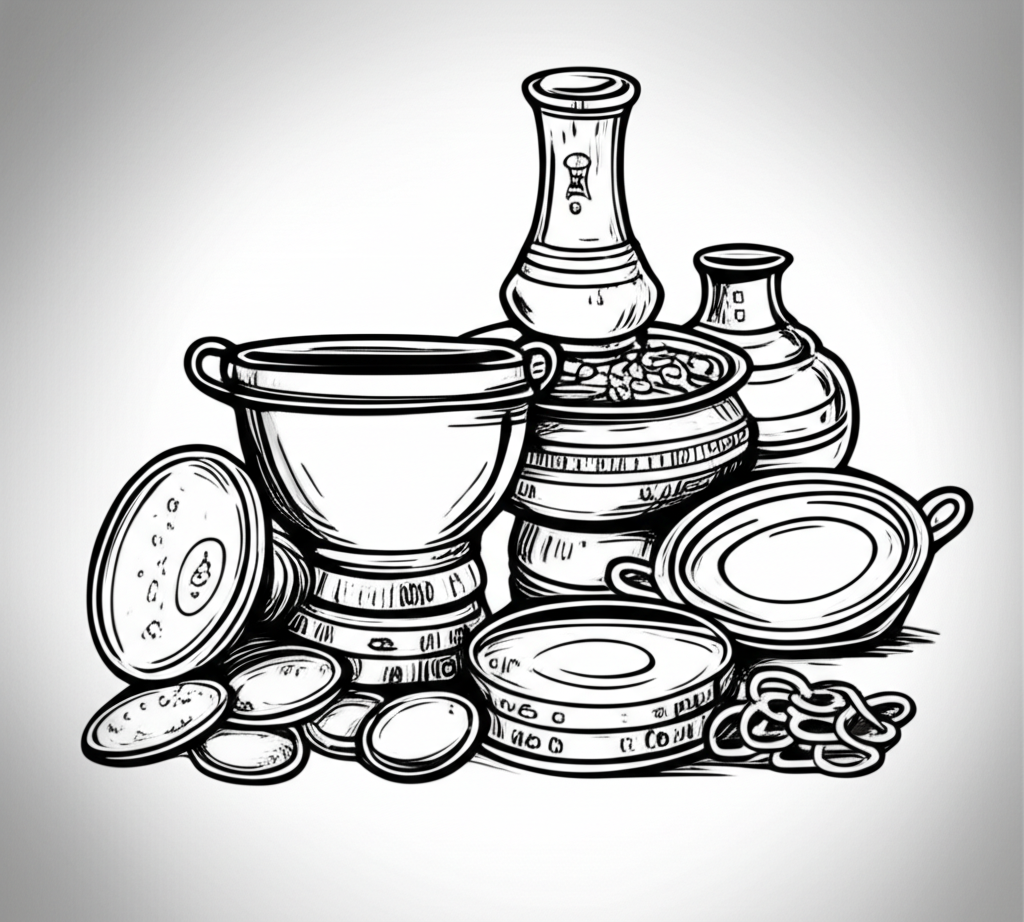
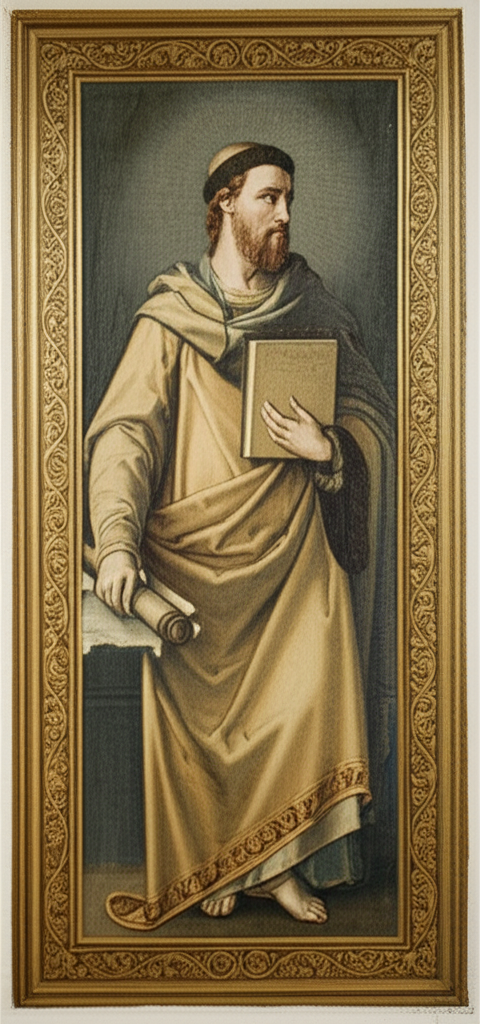
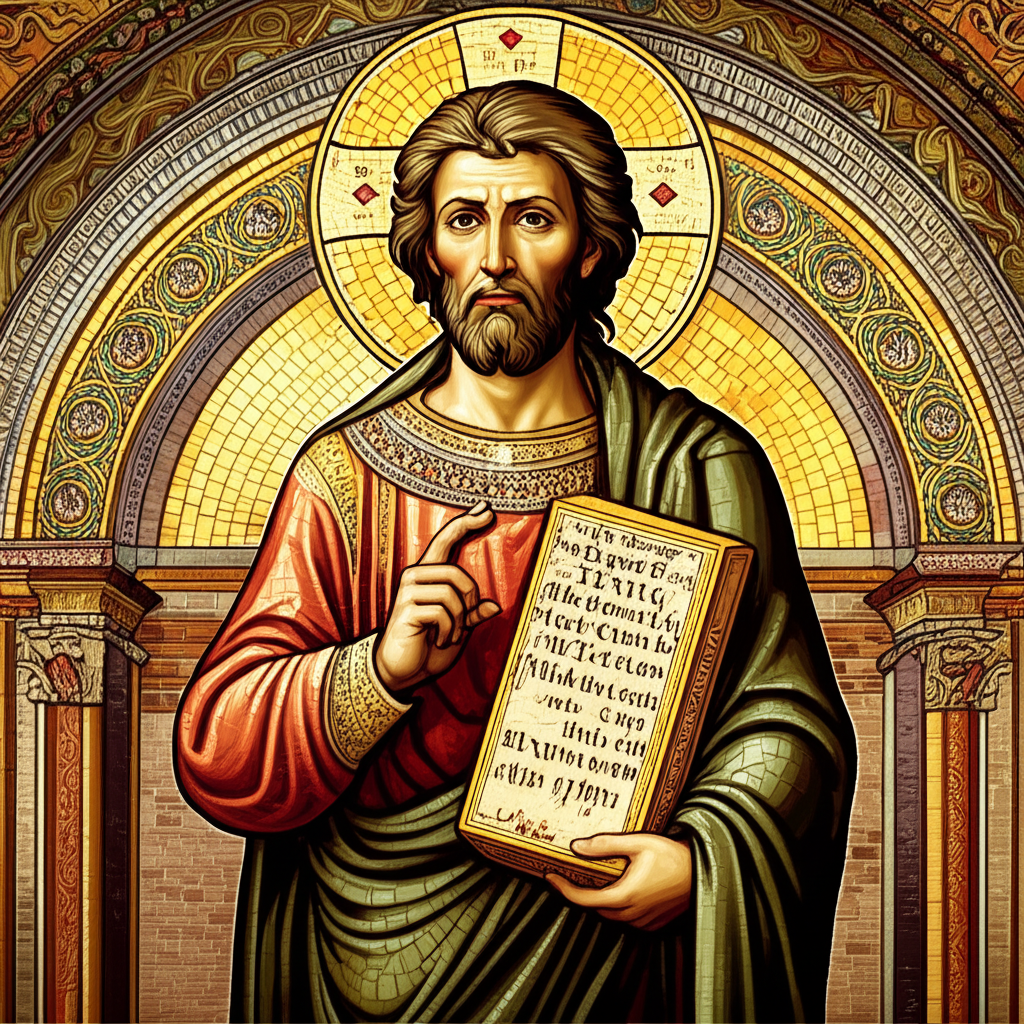
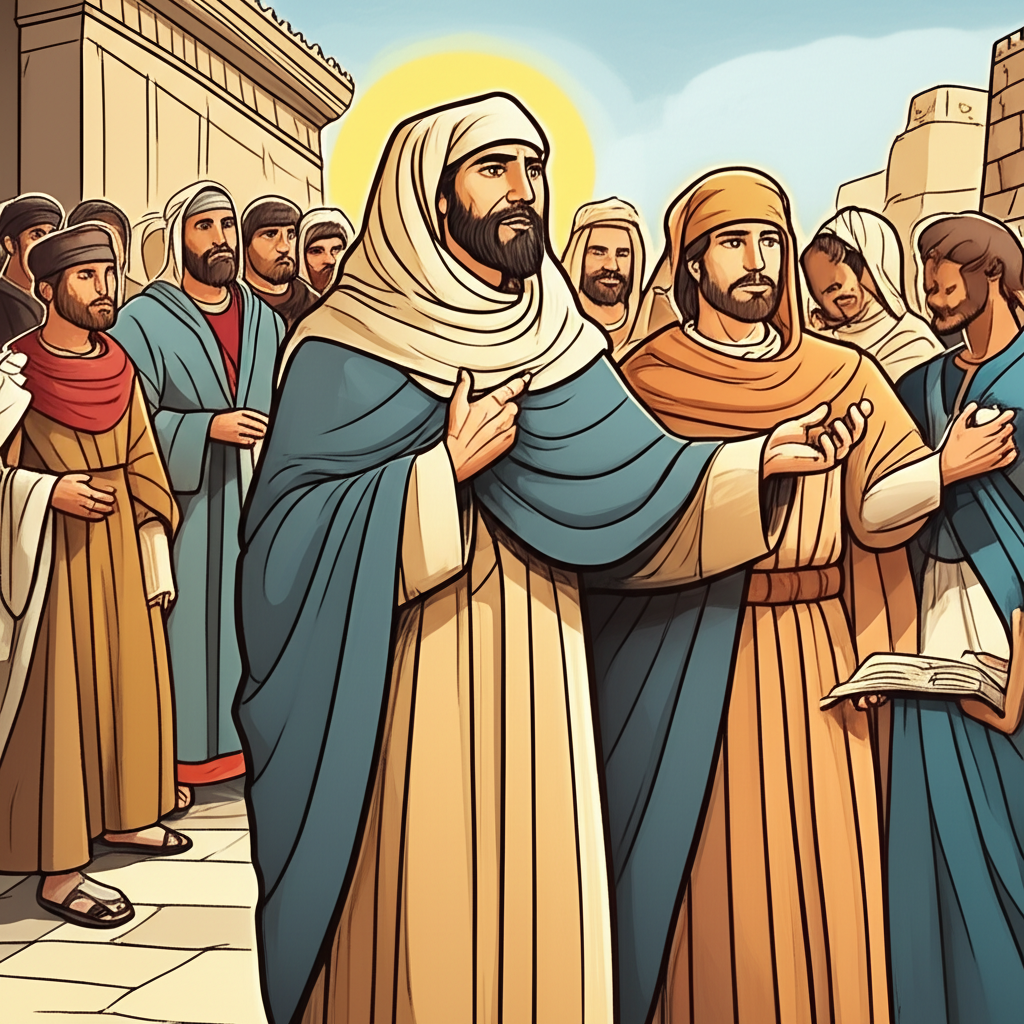
Ezra chapter 7 kjv
- 1 Now after these things, in the reign of Artaxerxes king of Persia, Ezra the son of Seraiah, the son of Azariah, the son of Hilkiah,
- 2 The son of Shallum, the son of Zadok, the son of Ahitub,
- 3 The son of Amariah, the son of Azariah, the son of Meraioth,
- 4 The son of Zerahiah, the son of Uzzi, the son of Bukki,
- 5 The son of Abishua, the son of Phinehas, the son of Eleazar, the son of Aaron the chief priest:
- 6 This Ezra went up from Babylon; and he was a ready scribe in the law of Moses, which the LORD God of Israel had given: and the king granted him all his request, according to the hand of the LORD his God upon him.
- 7 And there went up some of the children of Israel, and of the priests, and the Levites, and the singers, and the porters, and the Nethinims, unto Jerusalem, in the seventh year of Artaxerxes the king.
- 8 And he came to Jerusalem in the fifth month, which was in the seventh year of the king.
- 9 For upon the first day of the first month began he to go up from Babylon, and on the first day of the fifth month came he to Jerusalem, according to the good hand of his God upon him.
- 10 For Ezra had prepared his heart to seek the law of the LORD, and to do it, and to teach in Israel statutes and judgments.
- 11 Now this is the copy of the letter that the king Artaxerxes gave unto Ezra the priest, the scribe, even a scribe of the words of the commandments of the LORD, and of his statutes to Israel.
- 12 Artaxerxes, king of kings, unto Ezra the priest, a scribe of the law of the God of heaven, perfect peace, and at such a time.
- 13 I make a decree, that all they of the people of Israel, and of his priests and Levites, in my realm, which are minded of their own freewill to go up to Jerusalem, go with thee.
- 14 Forasmuch as thou art sent of the king, and of his seven counsellors, to enquire concerning Judah and Jerusalem, according to the law of thy God which is in thine hand;
- 15 And to carry the silver and gold, which the king and his counsellors have freely offered unto the God of Israel, whose habitation is in Jerusalem,
- 16 And all the silver and gold that thou canst find in all the province of Babylon, with the freewill offering of the people, and of the priests, offering willingly for the house of their God which is in Jerusalem:
- 17 That thou mayest buy speedily with this money bullocks, rams, lambs, with their meat offerings and their drink offerings, and offer them upon the altar of the house of your God which is in Jerusalem.
- 18 And whatsoever shall seem good to thee, and to thy brethren, to do with the rest of the silver and the gold, that do after the will of your God.
- 19 The vessels also that are given thee for the service of the house of thy God, those deliver thou before the God of Jerusalem.
- 20 And whatsoever more shall be needful for the house of thy God, which thou shalt have occasion to bestow, bestow it out of the king's treasure house.
- 21 And I, even I Artaxerxes the king, do make a decree to all the treasurers which are beyond the river, that whatsoever Ezra the priest, the scribe of the law of the God of heaven, shall require of you, it be done speedily,
- 22 Unto an hundred talents of silver, and to an hundred measures of wheat, and to an hundred baths of wine, and to an hundred baths of oil, and salt without prescribing how much.
- 23 Whatsoever is commanded by the God of heaven, let it be diligently done for the house of the God of heaven: for why should there be wrath against the realm of the king and his sons?
- 24 Also we certify you, that touching any of the priests and Levites, singers, porters, Nethinims, or ministers of this house of God, it shall not be lawful to impose toll, tribute, or custom, upon them.
- 25 And thou, Ezra, after the wisdom of thy God, that is in thine hand, set magistrates and judges, which may judge all the people that are beyond the river, all such as know the laws of thy God; and teach ye them that know them not.
- 26 And whosoever will not do the law of thy God, and the law of the king, let judgment be executed speedily upon him, whether it be unto death, or to banishment, or to confiscation of goods, or to imprisonment.
- 27 Blessed be the LORD God of our fathers, which hath put such a thing as this in the king's heart, to beautify the house of the LORD which is in Jerusalem:
- 28 And hath extended mercy unto me before the king, and his counsellors, and before all the king's mighty princes. And I was strengthened as the hand of the LORD my God was upon me, and I gathered together out of Israel chief men to go up with me.
Ezra chapter 7 nkjv
- 1 Now after these things, in the reign of Artaxerxes king of Persia, Ezra the son of Seraiah, the son of Azariah, the son of Hilkiah,
- 2 the son of Shallum, the son of Zadok, the son of Ahitub,
- 3 the son of Amariah, the son of Azariah, the son of Meraioth,
- 4 the son of Zerahiah, the son of Uzzi, the son of Bukki,
- 5 the son of Abishua, the son of Phinehas, the son of Eleazar, the son of Aaron the chief priest?
- 6 this Ezra came up from Babylon; and he was a skilled scribe in the Law of Moses, which the LORD God of Israel had given. The king granted him all his request, according to the hand of the LORD his God upon him.
- 7 Some of the children of Israel, the priests, the Levites, the singers, the gatekeepers, and the Nethinim came up to Jerusalem in the seventh year of King Artaxerxes.
- 8 And Ezra came to Jerusalem in the fifth month, which was in the seventh year of the king.
- 9 On the first day of the first month he began his journey from Babylon, and on the first day of the fifth month he came to Jerusalem, according to the good hand of his God upon him.
- 10 For Ezra had prepared his heart to seek the Law of the LORD, and to do it, and to teach statutes and ordinances in Israel.
- 11 This is a copy of the letter that King Artaxerxes gave Ezra the priest, the scribe, expert in the words of the commandments of the LORD, and of His statutes to Israel:
- 12 Artaxerxes, king of kings, To Ezra the priest, a scribe of the Law of the God of heaven: Perfect peace, and so forth.
- 13 I issue a decree that all those of the people of Israel and the priests and Levites in my realm, who volunteer to go up to Jerusalem, may go with you.
- 14 And whereas you are being sent by the king and his seven counselors to inquire concerning Judah and Jerusalem, with regard to the Law of your God which is in your hand;
- 15 and whereas you are to carry the silver and gold which the king and his counselors have freely offered to the God of Israel, whose dwelling is in Jerusalem;
- 16 and whereas all the silver and gold that you may find in all the province of Babylon, along with the freewill offering of the people and the priests, are to be freely offered for the house of their God in Jerusalem?
- 17 now therefore, be careful to buy with this money bulls, rams, and lambs, with their grain offerings and their drink offerings, and offer them on the altar of the house of your God in Jerusalem.
- 18 And whatever seems good to you and your brethren to do with the rest of the silver and the gold, do it according to the will of your God.
- 19 Also the articles that are given to you for the service of the house of your God, deliver in full before the God of Jerusalem.
- 20 And whatever more may be needed for the house of your God, which you may have occasion to provide, pay for it from the king's treasury.
- 21 And I, even I, Artaxerxes the king, issue a decree to all the treasurers who are in the region beyond the River, that whatever Ezra the priest, the scribe of the Law of the God of heaven, may require of you, let it be done diligently,
- 22 up to one hundred talents of silver, one hundred kors of wheat, one hundred baths of wine, one hundred baths of oil, and salt without prescribed limit.
- 23 Whatever is commanded by the God of heaven, let it diligently be done for the house of the God of heaven. For why should there be wrath against the realm of the king and his sons?
- 24 Also we inform you that it shall not be lawful to impose tax, tribute, or custom on any of the priests, Levites, singers, gatekeepers, Nethinim, or servants of this house of God.
- 25 And you, Ezra, according to your God-given wisdom, set magistrates and judges who may judge all the people who are in the region beyond the River, all such as know the laws of your God; and teach those who do not know them.
- 26 Whoever will not observe the law of your God and the law of the king, let judgment be executed speedily on him, whether it be death, or banishment, or confiscation of goods, or imprisonment.
- 27 Blessed be the LORD God of our fathers, who has put such a thing as this in the king's heart, to beautify the house of the LORD which is in Jerusalem,
- 28 and has extended mercy to me before the king and his counselors, and before all the king's mighty princes. So I was encouraged, as the hand of the LORD my God was upon me; and I gathered leading men of Israel to go up with me.
Ezra chapter 7 niv
- 1 After these things, during the reign of Artaxerxes king of Persia, Ezra son of Seraiah, the son of Azariah, the son of Hilkiah,
- 2 the son of Shallum, the son of Zadok, the son of Ahitub,
- 3 the son of Amariah, the son of Azariah, the son of Meraioth,
- 4 the son of Zerahiah, the son of Uzzi, the son of Bukki,
- 5 the son of Abishua, the son of Phinehas, the son of Eleazar, the son of Aaron the chief priest?
- 6 this Ezra came up from Babylon. He was a teacher well versed in the Law of Moses, which the LORD, the God of Israel, had given. The king had granted him everything he asked, for the hand of the LORD his God was on him.
- 7 Some of the Israelites, including priests, Levites, musicians, gatekeepers and temple servants, also came up to Jerusalem in the seventh year of King Artaxerxes.
- 8 Ezra arrived in Jerusalem in the fifth month of the seventh year of the king.
- 9 He had begun his journey from Babylon on the first day of the first month, and he arrived in Jerusalem on the first day of the fifth month, for the gracious hand of his God was on him.
- 10 For Ezra had devoted himself to the study and observance of the Law of the LORD, and to teaching its decrees and laws in Israel.
- 11 This is a copy of the letter King Artaxerxes had given to Ezra the priest, a teacher of the Law, a man learned in matters concerning the commands and decrees of the LORD for Israel:
- 12 Artaxerxes, king of kings, To Ezra the priest, teacher of the Law of the God of heaven: Greetings.
- 13 Now I decree that any of the Israelites in my kingdom, including priests and Levites, who volunteer to go to Jerusalem with you, may go.
- 14 You are sent by the king and his seven advisers to inquire about Judah and Jerusalem with regard to the Law of your God, which is in your hand.
- 15 Moreover, you are to take with you the silver and gold that the king and his advisers have freely given to the God of Israel, whose dwelling is in Jerusalem,
- 16 together with all the silver and gold you may obtain from the province of Babylon, as well as the freewill offerings of the people and priests for the temple of their God in Jerusalem.
- 17 With this money be sure to buy bulls, rams and male lambs, together with their grain offerings and drink offerings, and sacrifice them on the altar of the temple of your God in Jerusalem.
- 18 You and your fellow Israelites may then do whatever seems best with the rest of the silver and gold, in accordance with the will of your God.
- 19 Deliver to the God of Jerusalem all the articles entrusted to you for worship in the temple of your God.
- 20 And anything else needed for the temple of your God that you are responsible to supply, you may provide from the royal treasury.
- 21 Now I, King Artaxerxes, decree that all the treasurers of Trans-Euphrates are to provide with diligence whatever Ezra the priest, the teacher of the Law of the God of heaven, may ask of you?
- 22 up to a hundred talents of silver, a hundred cors of wheat, a hundred baths of wine, a hundred baths of olive oil, and salt without limit.
- 23 Whatever the God of heaven has prescribed, let it be done with diligence for the temple of the God of heaven. Why should his wrath fall on the realm of the king and of his sons?
- 24 You are also to know that you have no authority to impose taxes, tribute or duty on any of the priests, Levites, musicians, gatekeepers, temple servants or other workers at this house of God.
- 25 And you, Ezra, in accordance with the wisdom of your God, which you possess, appoint magistrates and judges to administer justice to all the people of Trans-Euphrates?all who know the laws of your God. And you are to teach any who do not know them.
- 26 Whoever does not obey the law of your God and the law of the king must surely be punished by death, banishment, confiscation of property, or imprisonment.
- 27 Praise be to the LORD, the God of our ancestors, who has put it into the king's heart to bring honor to the house of the LORD in Jerusalem in this way
- 28 and who has extended his good favor to me before the king and his advisers and all the king's powerful officials. Because the hand of the LORD my God was on me, I took courage and gathered leaders from Israel to go up with me.
Ezra chapter 7 esv
- 1 Now after this, in the reign of Artaxerxes king of Persia, Ezra the son of Seraiah, son of Azariah, son of Hilkiah,
- 2 son of Shallum, son of Zadok, son of Ahitub,
- 3 son of Amariah, son of Azariah, son of Meraioth,
- 4 son of Zerahiah, son of Uzzi, son of Bukki,
- 5 son of Abishua, son of Phinehas, son of Eleazar, son of Aaron the chief priest ?
- 6 this Ezra went up from Babylonia. He was a scribe skilled in the Law of Moses that the LORD, the God of Israel, had given, and the king granted him all that he asked, for the hand of the LORD his God was on him.
- 7 And there went up also to Jerusalem, in the seventh year of Artaxerxes the king, some of the people of Israel, and some of the priests and Levites, the singers and gatekeepers, and the temple servants.
- 8 And Ezra came to Jerusalem in the fifth month, which was in the seventh year of the king.
- 9 For on the first day of the first month he began to go up from Babylonia, and on the first day of the fifth month he came to Jerusalem, for the good hand of his God was on him.
- 10 For Ezra had set his heart to study the Law of the LORD, and to do it and to teach his statutes and rules in Israel.
- 11 This is a copy of the letter that King Artaxerxes gave to Ezra the priest, the scribe, a man learned in matters of the commandments of the LORD and his statutes for Israel:
- 12 "Artaxerxes, king of kings, to Ezra the priest, the scribe of the Law of the God of heaven. Peace. And now
- 13 I make a decree that anyone of the people of Israel or their priests or Levites in my kingdom, who freely offers to go to Jerusalem, may go with you.
- 14 For you are sent by the king and his seven counselors to make inquiries about Judah and Jerusalem according to the Law of your God, which is in your hand,
- 15 and also to carry the silver and gold that the king and his counselors have freely offered to the God of Israel, whose dwelling is in Jerusalem,
- 16 with all the silver and gold that you shall find in the whole province of Babylonia, and with the freewill offerings of the people and the priests, vowed willingly for the house of their God that is in Jerusalem.
- 17 With this money, then, you shall with all diligence buy bulls, rams, and lambs, with their grain offerings and their drink offerings, and you shall offer them on the altar of the house of your God that is in Jerusalem.
- 18 Whatever seems good to you and your brothers to do with the rest of the silver and gold, you may do, according to the will of your God.
- 19 The vessels that have been given you for the service of the house of your God, you shall deliver before the God of Jerusalem.
- 20 And whatever else is required for the house of your God, which it falls to you to provide, you may provide it out of the king's treasury.
- 21 "And I, Artaxerxes the king, make a decree to all the treasurers in the province Beyond the River: Whatever Ezra the priest, the scribe of the Law of the God of heaven, requires of you, let it be done with all diligence,
- 22 up to 100 talents of silver, 100 cors of wheat, 100 baths of wine, 100 baths of oil, and salt without prescribing how much.
- 23 Whatever is decreed by the God of heaven, let it be done in full for the house of the God of heaven, lest his wrath be against the realm of the king and his sons.
- 24 We also notify you that it shall not be lawful to impose tribute, custom, or toll on anyone of the priests, the Levites, the singers, the doorkeepers, the temple servants, or other servants of this house of God.
- 25 "And you, Ezra, according to the wisdom of your God that is in your hand, appoint magistrates and judges who may judge all the people in the province Beyond the River, all such as know the laws of your God. And those who do not know them, you shall teach.
- 26 Whoever will not obey the law of your God and the law of the king, let judgment be strictly executed on him, whether for death or for banishment or for confiscation of his goods or for imprisonment."
- 27 Blessed be the LORD, the God of our fathers, who put such a thing as this into the heart of the king, to beautify the house of the LORD that is in Jerusalem,
- 28 and who extended to me his steadfast love before the king and his counselors, and before all the king's mighty officers. I took courage, for the hand of the LORD my God was on me, and I gathered leading men from Israel to go up with me.
Ezra chapter 7 nlt
- 1 Many years later, during the reign of King Artaxerxes of Persia, there was a man named Ezra. He was the son of Seraiah, son of Azariah, son of Hilkiah,
- 2 son of Shallum, son of Zadok, son of Ahitub,
- 3 son of Amariah, son of Azariah, son of Meraioth,
- 4 son of Zerahiah, son of Uzzi, son of Bukki,
- 5 son of Abishua, son of Phinehas, son of Eleazar, son of Aaron the high priest.
- 6 This Ezra was a scribe who was well versed in the Law of Moses, which the LORD, the God of Israel, had given to the people of Israel. He came up to Jerusalem from Babylon, and the king gave him everything he asked for, because the gracious hand of the LORD his God was on him.
- 7 Some of the people of Israel, as well as some of the priests, Levites, singers, gatekeepers, and Temple servants, traveled up to Jerusalem with him in the seventh year of King Artaxerxes' reign.
- 8 Ezra arrived in Jerusalem in August of that year.
- 9 He had arranged to leave Babylon on April 8, the first day of the new year, and he arrived at Jerusalem on August 4, for the gracious hand of his God was on him.
- 10 This was because Ezra had determined to study and obey the Law of the LORD and to teach those decrees and regulations to the people of Israel.
- 11 King Artaxerxes had given a copy of the following letter to Ezra, the priest and scribe who studied and taught the commands and decrees of the LORD to Israel:
- 12 "From Artaxerxes, the king of kings, to Ezra the priest, the teacher of the law of the God of heaven. Greetings.
- 13 "I decree that any of the people of Israel in my kingdom, including the priests and Levites, may volunteer to return to Jerusalem with you.
- 14 I and my council of seven hereby instruct you to conduct an inquiry into the situation in Judah and Jerusalem, based on your God's law, which is in your hand.
- 15 We also commission you to take with you silver and gold, which we are freely presenting as an offering to the God of Israel who lives in Jerusalem.
- 16 "Furthermore, you are to take any silver and gold that you may obtain from the province of Babylon, as well as the voluntary offerings of the people and the priests that are presented for the Temple of their God in Jerusalem.
- 17 These donations are to be used specifically for the purchase of bulls, rams, male lambs, and the appropriate grain offerings and liquid offerings, all of which will be offered on the altar of the Temple of your God in Jerusalem.
- 18 Any silver and gold that is left over may be used in whatever way you and your colleagues feel is the will of your God.
- 19 "But as for the cups we are entrusting to you for the service of the Temple of your God, deliver them all to the God of Jerusalem.
- 20 If you need anything else for your God's Temple or for any similar needs, you may take it from the royal treasury.
- 21 "I, Artaxerxes the king, hereby send this decree to all the treasurers in the province west of the Euphrates River : 'You are to give Ezra, the priest and teacher of the law of the God of heaven, whatever he requests of you.
- 22 You are to give him up to 7,500 pounds of silver, 500 bushels of wheat, 550 gallons of wine, 550 gallons of olive oil, and an unlimited supply of salt.
- 23 Be careful to provide whatever the God of heaven demands for his Temple, for why should we risk bringing God's anger against the realm of the king and his sons?
- 24 I also decree that no priest, Levite, singer, gatekeeper, Temple servant, or other worker in this Temple of God will be required to pay tribute, customs, or tolls of any kind.'
- 25 "And you, Ezra, are to use the wisdom your God has given you to appoint magistrates and judges who know your God's laws to govern all the people in the province west of the Euphrates River. Teach the law to anyone who does not know it.
- 26 Anyone who refuses to obey the law of your God and the law of the king will be punished immediately, either by death, banishment, confiscation of goods, or imprisonment."
- 27 Praise the LORD, the God of our ancestors, who made the king want to beautify the Temple of the LORD in Jerusalem!
- 28 And praise him for demonstrating such unfailing love to me by honoring me before the king, his council, and all his mighty nobles! I felt encouraged because the gracious hand of the LORD my God was on me. And I gathered some of the leaders of Israel to return with me to Jerusalem.
- Bible Book of Ezra
- 1 The Proclamation of Cyrus
- 2 The Exiles Return
- 3 Rebuilding the Altar
- 4 Adversaries Oppose the Rebuilding
- 5 Rebuilding Begins Anew
- 6 The Decree of Darius
- 7 Ezra Sent to Teach the People
- 8 Genealogy of Those Who Returned with Ezra
- 9 Ezra Prays About Intermarriage
- 10 The People Confess Their Sin